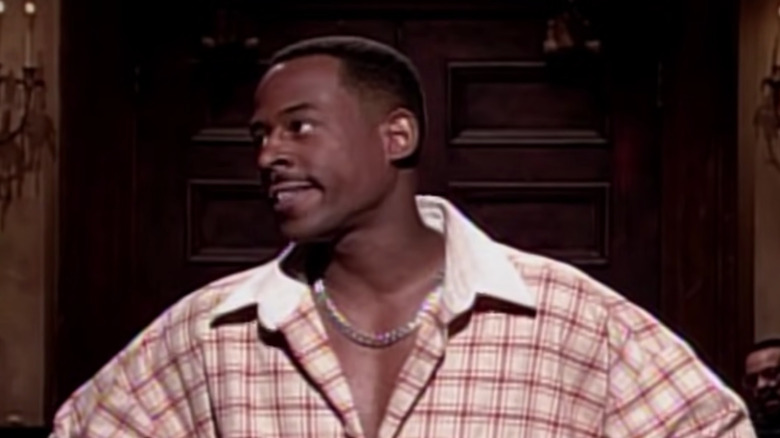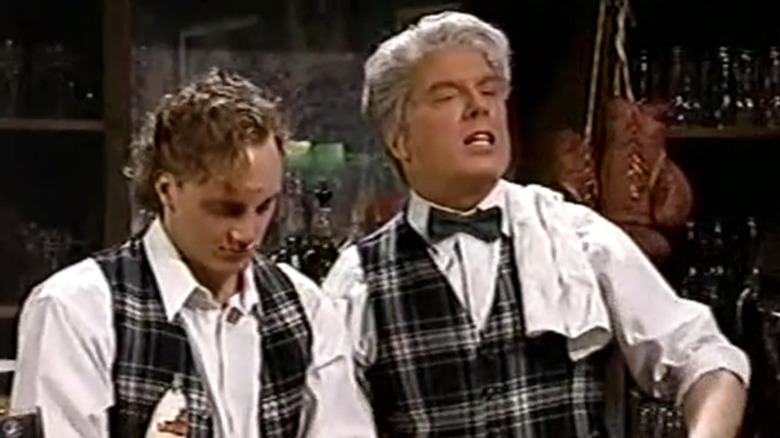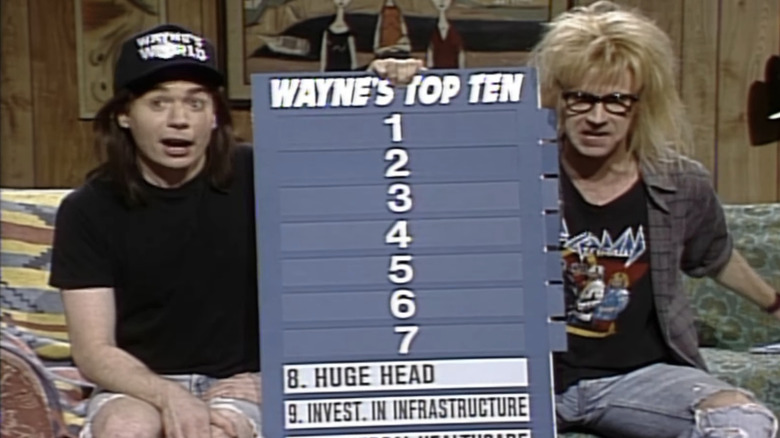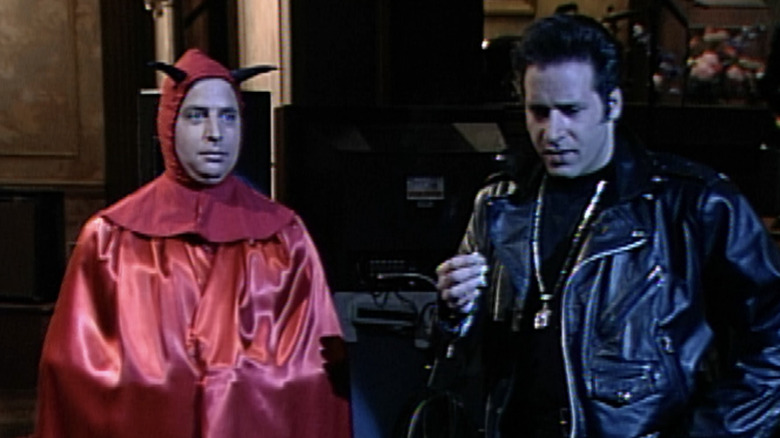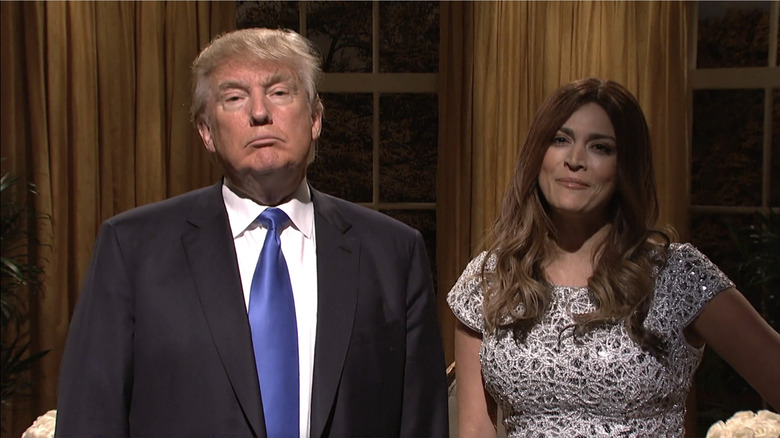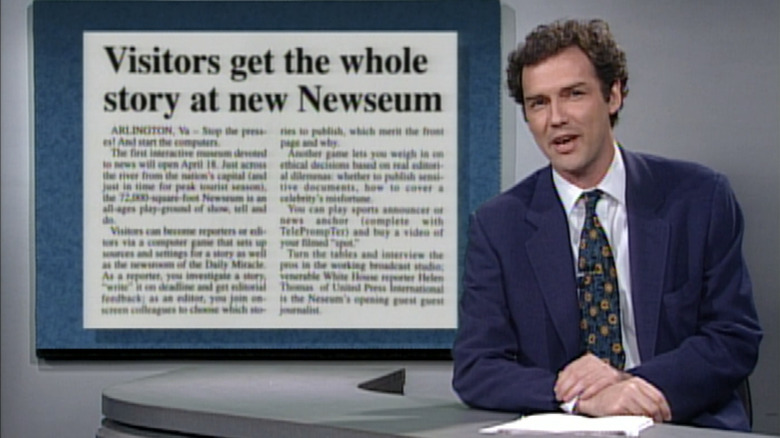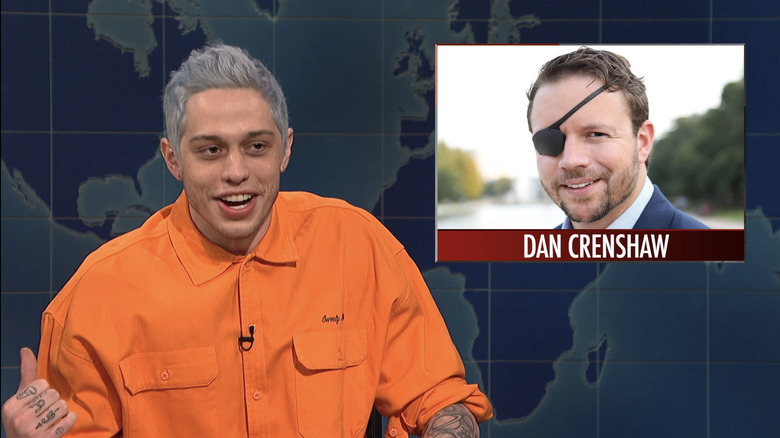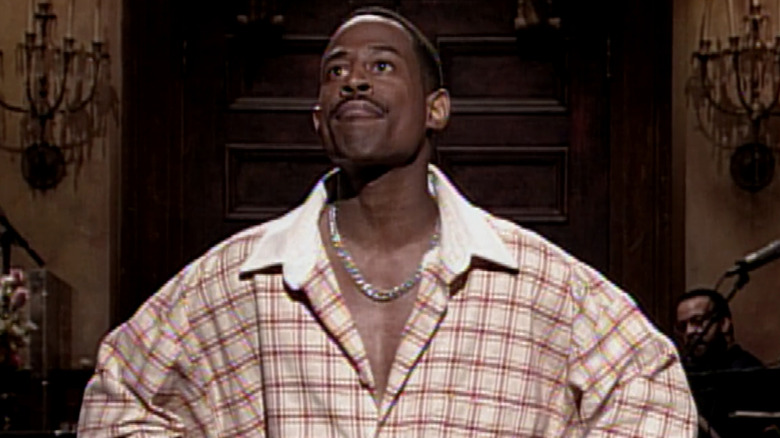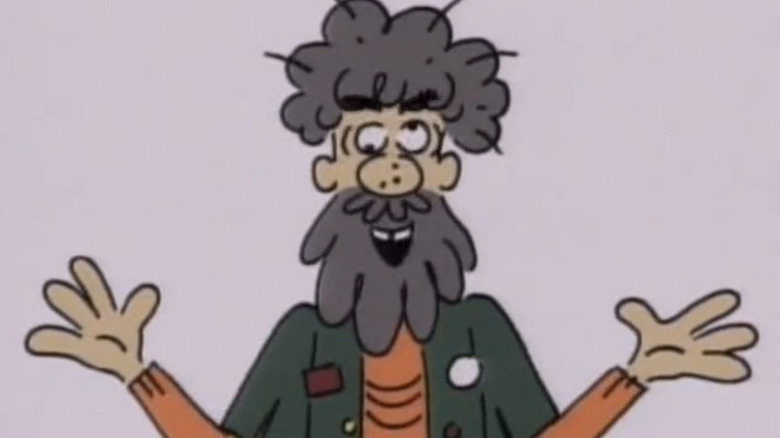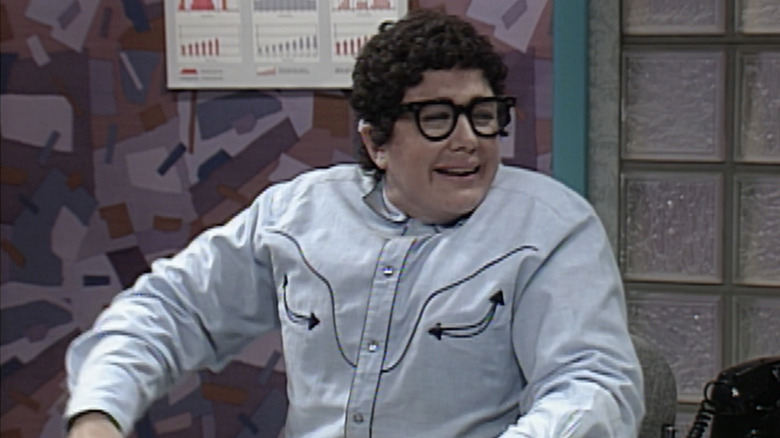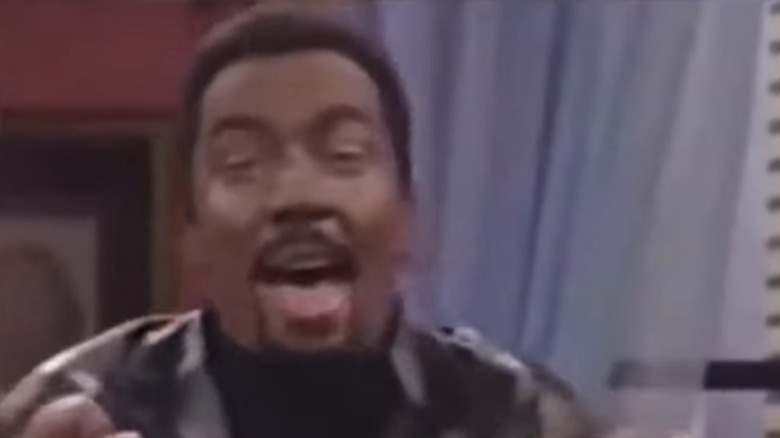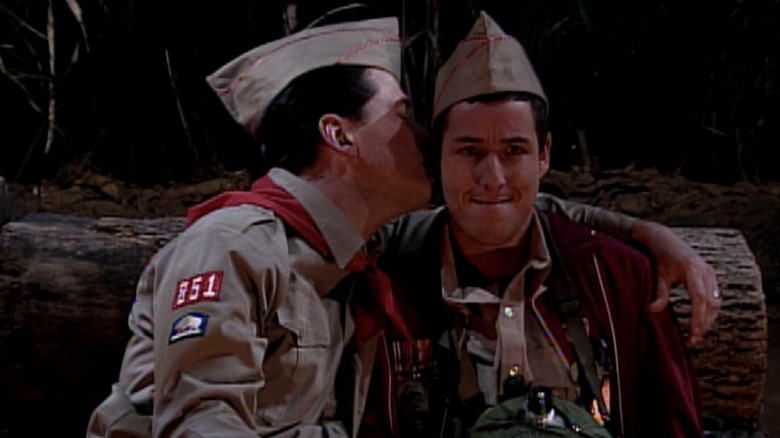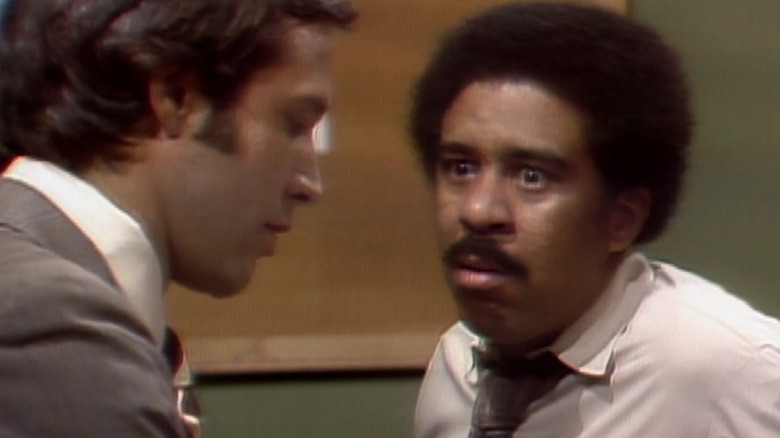SNL's Most Controversial Sketches Of All Time
"Saturday Night Live" is, by all accounts, a well-oiled machine. Anyone who can produce a live weekly 90-minute sketch comedy and music show every year for nearly 50 years must know what they're doing. The fact that the vast majority of episodes go off without a hitch is nothing short of miraculous. In all those thousands of hours of television, though, there are bound to be a few where things did not go according to plan. Hours when Elvis Costello switches up the song he's performing at the last minute, or when Sinead O'Connor makes an unexpected stand against child abuse by the Catholic Church. Hours when Justin Bieber is nearly crushed by a falling set wall, or when everyone from Charles Rocket to Kristen Stewart to Samuel L. Jackson lets slip some TV-unfriendly language.
Then there are the times when things off the rails on purpose. There have been a number of controversial "SNL" moments when everything went exactly according to plan — sketches that were written, rehearsed, and performed live with the full cooperation of not just show producer Lorne Michaels, but also the cast and crew. Some of these were simply ill-advised, some seemed appropriate at the time but have aged poorly, some hint at behind-the-scenes turmoil, and some were just too real for the audience to handle. Let's take a look at some of the most controversial "Saturday Night Live" sketches of all time.
O'Callahan & Son Pub
The 20th season of "SNL" is generally regarded as one of the show's worst, a would-be overhaul season where new cast members like Michael McKean, Chris Elliott, and Janeane Garofalo struggled on screen, while returning cast members Chris Farley, David Spade, and Adam Sandler went through the motions. (The next season, which introduced Will Ferrell, Cheri Oteri, and Ana Gasteyer, proved a much more successful overhaul). The final sketch of the March 18, 1995, episode, hosted by Paul Reiser, was "O'Callahan & Son Pub," written by new cast member Jay Mohr and featuring him and McKean as a pair of surly Irish bartenders who berate their customers and lament that no one drinks like they used to.
It is a nearly laughless sketch, five minutes of silence as the cast cycles through four different variations of the same premise. That in itself is, sadly, not out of the ordinary for a Season 20 sketch, but what makes this one so notable is where it came from: Mohr plagiarized the premise and most of the dialogue from a routine performed by New Jersey stand-up Rick Shapiro. "SNL" has been accused of stealing jokes in the past, though this is one of the few times when it has acknowledged the theft; the sketch was removed from repeat broadcasts.
Wayne's World
In the early 1990s, Mike Myers' recurring "Wayne's World" sketch — in which a couple of dummies played by Myers and Dana Carvey host a public access show in the basement of Wayne's parents' home — became a pop culture phenomenon, spawning catchphrases and putting classic rock tunes back on the charts. The success of the "Wayne's World" movie in 1992 and its 1993 sequel paved the way for a series of increasingly ill-advised "SNL" feature films. For most of the first Bush administration, Wayne Campbell and his buddy Garth were on top of the world.
That kind of national attention can be a double-edged sword, especially when the duo's goofball horniness tips over into bad taste. In a December 1992 sketch, Wayne and Garth celebrated Bill Clinton's recent electoral victory over George Bush with a "Top Ten" list of things they love about Clinton. It's a typical mix of trenchant observation (Number 9: Investment in infrastructure) and dumb jokes (Number 8: Huge head), but after panting over Al Gore's teenage daughters ("Finally some talent in the White House," says Garth), the next joke took aim at Clinton daughter Chelsea, who was 12 years old at the time, with Wayne calling her a "babe in waiting." Condemnation was swift, both from the media and from the Clintons. Myers and producer Lorne Michaels issued a public apology, and the joke was scrubbed from later broadcasts.
Andrew Dice Clay
Stand-up comic Andrew Dice Clay built a massive following for himself in the late 1980s. With his pompadour and studded leather jackets, he cut the image of a cartoon 1950s greaser. His act revolved around a tough-guy posture and nursery rhymes rewritten with raunchy, often sexist lyrics. When it was announced that Clay would be hosting "SNL" in May 1990, cast member Nora Dunn and planned musical guest Sinead O'Connor both boycotted the episode in protest of his misogynist stage persona. (Years later, castmate Jon Lovitz speculated that Dunn's boycott was a publicity stunt due to her leaving the show after that season.)
In response, the show threw Dunn under the bus — or amp, as it were. The opening sketch is a parody of "It's a Wonderful Life" in which Clay is shown a world in which he was never born by his guardian devil (Jon Lovitz). Because he was not alive to host "SNL," Dunn and O'Connor were both present, leading to a tragic accident in which Dunn — played by a pair of prop legs like the Wicked Witch of the East — is crushed to death by one of O'Connor's amps. The crowd eats this joke up, either because they sided with Clay or due to the excitement of some juicy backstage drama playing out on camera. Jan Hooks and Victoria Jackson, the other female cast members at the time, did not join Dunn's walk-out, though during the cast goodbyes at the end of the episode, Hooks seems to be deliberately avoiding contact with Clay, to the point of using Mike Myers and Dennis Miller as human shields.
Trump White House
Prior to 2015, Donald Trump had already run for president and hosted "SNL," and wasn't terribly good at either. After announcing his bid for the executive office in June of that year, the erstwhile "Apprentice" host appeared on the November 7 episode with musical guest Sia. The 2016 election was already well underway, at least comedically; the episode's cold open featured Kate McKinnon as Hillary Clinton and Larry David as her Democratic rival Bernie Sanders. Other than a few uninspired nonpolitical bits such as putting Trump in nerdy glasses and having him dance to Song of the Summer "Hotline Bling", the entire episode is focused on the fact that he is running for president — most egregiously in a sketch that presents a hypothetical Trump White House as a bastion of non-stop winning and good vibes.
The sketch's toothless punchline — that the entire thing is an ad sponsored by a Melania Trump Super PAC — does little to dull the feeling that we are watching a paid political ad rather than a comedy show. In the years since, several of the show's cast have spoken out against the episode; Taran Killam, who played Trump several times on the show before it outsourced impersonation duties to Alec Baldwin, told NPR in 2017 that the experience was "not enjoyable at the time and something that only grows more embarrassing and shameful as time goes on."
Norm Macdonald
Norm Macdonald swore on camera in April 1997 and by the end of the year was fired from "SNL." While delivering a "Weekend Update" joke about the then-new Newseum in Washington, DC, something caught in Macdonald's throat and caused him to trip up on his words. "The f**k was that?" he muttered — under his breath, but loud enough for everyone in the audience and at home to hear him. "My farewell performance," he joked a moment later, but Norm actually finished up the rest of Season 22 and was still a cast member and "Update" through the first half of Season 23 before unexpectedly getting let go after the last episode of 1997.
The decision came from the very top, NBC president Don Ohlmeyer, who famously did not care for Macdonald's brand of humor. It must be said that Norm's time at the "Update" desk (which started in 1994) was not for everyone, beloved though it may be in comedy nerd circles. Macdonald seemed to get a charge out of antagonizing the audience, either with jokes that played to dead air or some remarkably nasty punchlines. While his poor hit-to-miss joke ratio or his F-bomb incident may have been the reasons for his firing, Macdonald and others (including a sketch further down this list) speculated that Ohlmeyer's beef was really with the show's constant jokes about his friend O.J. Simpson, who was famously on trial for murder during Norm's tenure.
Pete Davidson and Dan Crenshaw
In a November 2018 "Weekend Update" segment, Pete Davidson did a rapid-fire segment of jokes about various candidates in the upcoming midterm elections — specifically, jokes about their looks. One of the people featured was Texas congressional candidate Dan Crenshaw, who Davidson joked looked like "a hitman in a porno movie" because of his eyepatch, then offhandedly acknowledged that Crenshaw lost his eye "in war, or whatever." The joke drew sharp criticism from conservatives who took it to be disrespectful of Crenshaw's military service and, perhaps disingenuously, of military veterans in general.
A week later, Davidson returned to "Update" with a special guest: Crenshaw, now a congressman-elect. In the spirit of unity, Davidson apologized for his joke, while Crenshaw got in a few decent jabs of his own at Davidson's expense. The drummed-up controversy around the original joke was mostly forgotten until two years later, when Davidson admitted in a stand-up special that the apology was more or less forced upon him after he received death threats over the joke. "My roommate [his mother] thought I should apologize so that I didn't get shot in the face," he said, while regretting the fact that his joke gave Crenshaw a national spotlight he otherwise would never have had.
Martin Lawrence's monologue
"I hope the kids are in bed, you know, 'cause I gotta talk, y'all," Martin Lawrence says near the start of his "SNL" monologue from February 1994. At the time, Lawrence was a hot stand-up comic and the star of his own Fox sitcom. His material was often raunchy. The beginning of his monologue is essentially a preamble, with Lawrence indirectly warning the audience — by noting all the white people in the crowd, mentioning that the network censors had been following him around, and the above comment about putting the kids to bed — that some dicey waters were ahead.
First comes a commentary on the Lorena Bobbitt scandal, and Lawrence's concern that angry white women are out there cutting off men's "pilly-packers." From there, he segues into a different concern about the state of women in the '90s: Their hygiene. The uncensored monologue can be found online, but in rebroadcasts, the show cuts away at this moment to an on-screen message narrated by writer-producer James Downey that uses comically dry corporate language to summarize Martin's routine. "It was a frank and lively presentation," the message concludes, "and it nearly cost us all our jobs." The incident got Lawrence permanently banned from the show.
Conspiracy Theory Rock
Writer/actor/insult comic dog puppeteer Robert Smigel produced his "TV Funhouse" animated shorts for "SNL" starting in 1996. Animated in the cheap-looking style of 1970s Saturday morning cartoons, the segments often played on Gen-X nostalgia with recurring bits like "The Ambiguously Gay Duo" and "The X-Presidents." For the show airing on March 14, 1998, Smigel produced "Conspiracy Theory Rock," a "Schoolhouse Rock" parody purporting to show the insidious connection between the military-industrial complex and media conglomerates (including NBC, which was owned by General Electric at the time) who do its bidding. The cartoon is light on jokes, though a moment when it appears that NBC has censored the segment got a big laugh. At the end, Smigel sneaks in a reference to the firing of Norm Macdonald, as the segment's funky '70s-style song goes, "Why'd they take Norm Macdonald away/'Cause he made too many jokes about O.J."
After that initial broadcast, "Conspiracy Theory Rock" just...disappeared. The segment was not included in the 60-minute version of the episode that aired in syndication, nor is it included in the version that currently streams on Peacock. Befitting its theme, conspiracy theories have cropped up over the years that the piece was intentionally stifled by NBC's corporate overlords, though the fact that it was included on a 2006 DVD release of "TV Funhouse" clips would seem to put a damper on that idea.
It's Pat
The early 1990s were a second golden age for "SNL" characters who broke free from their sketch comedy origins and took on a life of their own in the popular consciousness, from Wayne Campbell and Garth Algar and Austrian bodybuilders Hans and Franz to Rob Schneider's obnoxious office guy. From the vantage point of three decades later, none of these breakout characters boggle the mind quite so much as Julia Sweeney's Pat, a dyspeptic nerd whose androgynous appearance frustrates everyone they meet. The joke of each sketch is that no one can tell if Pat is a man or a woman; Pat, meanwhile, is either oblivious to their discomfort or intentionally withholding.
Pat was massively popular at the time, and even got their own movie in 1994; but for trans and gender nonconforming people, the character was often seen as an insulting caricature, lampooning the daily indignities they suffered at the hands of mainstream society. A 1992 sketch featuring Linda Hamilton as a personal trainer even anticipated a culture war front decades in the future, as Pat has to choose which locker room to use at the gym (we never find out the answer, as the sketch cuts to a news report from Kevin Nealon right at the moment of decision). In recent years, Sweeney has acknowledged the criticisms of the character and her performance by people like "Transparent" creator Jill Soloway. She even resurrected Pat for the Showtime series "Work in Progress" starring comedian Abby McEnany.
Regis Co-Host Auditions
In 2020, "Tonight Show" host Jimmy Fallon issued a public apology after a video of an old "SNL" sketch made the rounds on social media. Pulled from the March 11, 2000, episode, the sketch features Darrell Hammond as talk show host Regis Philbin interviewing replacements for recently departed co-host Kathy Lee Gifford. It's the type of scene that allows a lot of cast members to show off their impersonation chops, with Rachel Dratch as Janeane Garofalo; Cheri Oteri and Tracy Morgan as "The View" co-hosts Barbara Walters and Star Jones, respectively; host Joshua Jackson as Donny Osmond; and Fallon in blackface as former "SNL" cast member Chris Rock.
Fallon's brief appearance in the sketch has been removed from the version available on Peacock and effectively scrubbed from the internet. Despite the brief burst of attention, Fallon was not the first "SNL" cast member to indulge in some character-specific blackface — nor was he the last. Billy Crystal's brief time on the show in the 1984-85 season was distinguished by his impersonations of Sammy Davis, Jr. and Muhammad Ali. A decade later, Darrell Hammond would add the Rev. Jesse Jackson to his extensive list of characters. Well into the 21st century, the tradition continued, whether it was Horatio Sanz as Aaron Neville in a Hurricane Katrina sketch or Fred Armisen playing Barack Obama for the entirety of Obama's first term.
Canteen Boy and the Scout Master
Before there was "The Waterboy," there was Canteen Boy, a socially awkward man-child with an abiding love for water and the outdoors and, for some reason, the ability to summon snakes at will. The predecessor to Adam Sandler's cinematic ragin' Cajun made his debut in 1993, but the character's most infamous appearance would happen a year later, in a Valentine's Day episode hosted by then-spouses Alec Baldwin and Kim Basinger. In "Canteen Boy and the Scout Master," Canteen Boy (who, again, is a grown man) must fend off the amorous advances of a scoutmaster (Baldwin) who won't take no for an answer. Nuzzling an obviously mortified Canteen Boy, the scoutmaster takes off his shirt, licks Canteen Boy's fingers, and invites him to play Truth or Dare before grinding against him underneath their shared sleeping bag.
The sketch was immediately notorious, so much so that when Baldwin returned to host later in 1994, Canteen Boy was the subject of his monologue. Condemnation of the Canteen Boy sketch was so swift and unequivocal, according to Baldwin, that he and Sandler have decided to take a politically correct version of it on the road to schools and churches, one where Canteen Boy's name is changed to Proudly Bisexual Canteen Person, and the scoutmaster seeks consent before initiating contact. While the monologue is clearly a joke, subsequent broadcasts of the original sketch included a preface read by James Downey, reiterating that Canteen Boy is indeed a grown able-bodied man and not a child or developmentally disabled.
Word Association
A white man (Chevy Chase) interviews a Black man (Richard Pryor) for a job. It has apparently been a lengthy interview process full of various psychological tests, and the last step is a simple word association exercise. Chase's character will say a word, and Pryor's will say whatever word pops into his head in response. After a couple of test words ("dog," "tree"), Chase says, "Black." A brief pause, then Pryor replies, "White." And with that, the game of the sketch is established, as Chase offers up racial slurs with increasing vitriol and Pryor responds in kind.
This Season 1 sketch, scripted by Pryor's longtime joke writer Paul Mooney, is brilliant in its simplicity; once the audience catches on, there is a palpable excitement in their reactions, wondering (or dreading) how far the sketch will go. Mooney's script is thematically concerned with the racism of corporate America and the lack of respect afforded to Black workers, but also earns laughs from the simple observation that there are far more slurs for Black people than for white people; after Pryor has reached "honky," he has nowhere else to go but "honky honky," and finally, when Chase says the N-word, "dead honky." Chase and especially Pryor keep the laughs going long after the sketch could have turned too uncomfortable to be funny. While often held up as an example of "SNL's" early, dangerous years, the sketch is actually an outlier, gutsier and more controversial than the show had ever been before or would ever be again.
